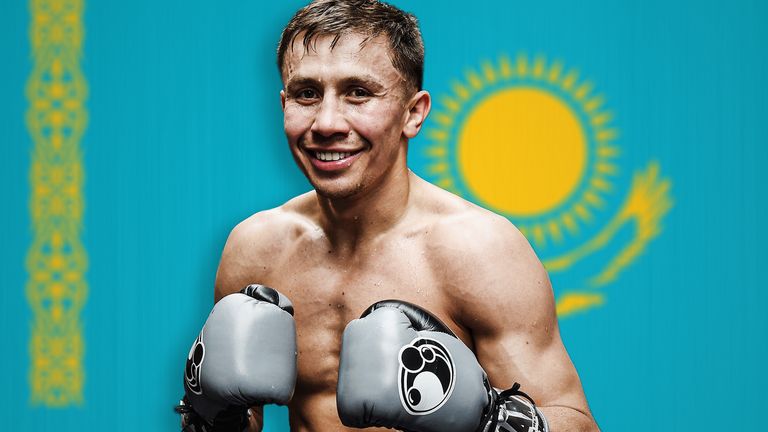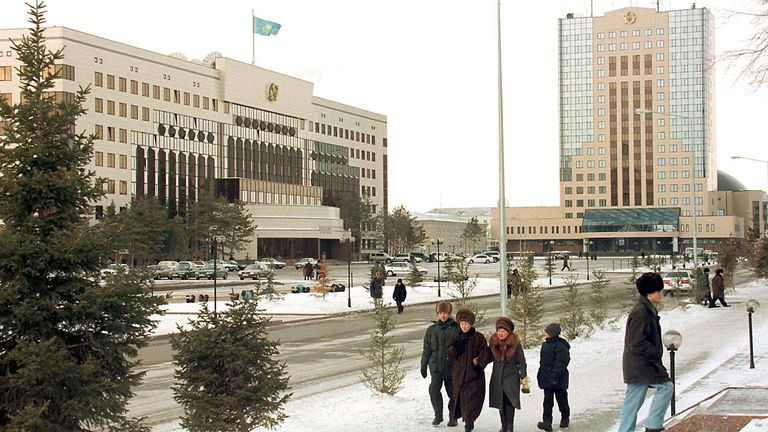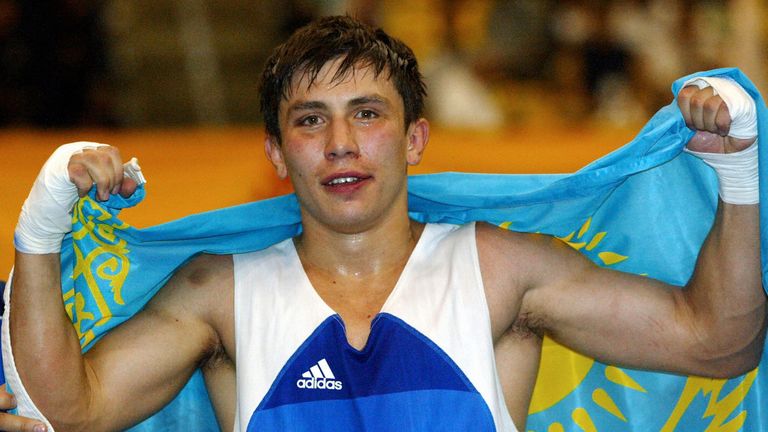Gennadiy Golovkin's long road to glory in Kazakhstan
"He wasn't as esteemed or revered as he is now. Back then, they didn't look up to him like they do now"
Wednesday 20 May 2020 18:19, UK
Gennadiy Golovkin's only fight in his home country was hastily arranged, barely watched and offered no clue as to the national hero he would become.
Kazakhstan is the ninth-largest country on Earth, the biggest without a coastline, and now boasts one of the top names in boxing as its own, a fighter who has repurposed his country's image and who politicians flock towards for photos. But it was not always like that.
Memories of Golovkin's only pro fight in Kazakhstan are a reminder of how far the world middleweight champion has come.
"It was cold, oh my goodness it was cold."
This was trainer Abel Sanchez's second time in the corner of Golovkin - the first occasion had been in the far warmer climate of Panama. Sanchez, Mexican-born and California-based, knew the long and freezing trip to where Europe meets Asia would eventually be worth it.
By 2010 Golovkin was feared by those who watched him, but the problem was that very few people had watched him. Even in his home country.
His only career fight in Kazakhstan was originally scheduled for Berlin, Germany, and was rearranged with little publicity at three weeks' notice.
"He wasn't popular because he wasn't on TV. He wasn't a big, big star," Sanchez told Sky Sports.
Kazakhstan had a feted amateur boxing programme but little major professional sport. Golovkin starred in the amateurs, culminating in an Olympic silver medal in 2004. It left a bitter taste, losing to a Russian in the final. Meanwhile, Bakhtiyar Artayev took a gold medal home to Kazakhstan. Golovkin has been sceptical of the politics behind his Olympic experience ever since.
He was not a local superstar. Then-trainer Sanchez said: "Very fair to say. There was no pro boxing in Kazakhstan then. They had amateur boxing but they never turned pro. People didn't follow Golovkin until he made his name in the US, then he became more popular in Kazakhstan.
"They knew him but he wasn't as esteemed or revered as he is now. Back then, they didn't look up to him like they do now."
Golovkin's father was Russian and his mother Korean - this was not unusual in Kazakhstan, a country that only gained its independence in 1991, but it was another detail that complicated his role as a sporting ambassador.
But Golovkin was, according to those who worked with him, showing why he was avoided by the world's top middleweights. He won the WBA interim title but a fight with established champion Felix Sturm did not materialise, so Golovkin's status was upgraded.
His first and only fight in Kazakhstan, in the capital city Astana, would be a maiden defence of the WBA middleweight title against Colombia's Nilson Julio Tapia.
"We fought in a tennis facility," Sanchez remembered. "We had a great crowd of 3,000 people and a great welcoming. Golovkin was cordial with his people."
Considering this was a world champion returning to his homeland, it was a far cry from arenas like Madison Square Garden and the T-Mobile where Golovkin would eventually headline.
The fight itself was three one-sided rounds in the champion's favour and his then-trainer remembered its thudding conclusion: "It was a left hook to the body - he went down to his knees, whimpering in pain."
Golovkin had been raised in Karaganda, a coal-mining town and a poor, difficult place to grow up. His two eldest brothers joined the army and never came home, with no explanation offered to the family. His twin Max was the better boxer when they were young, Golovkin once told Sky Sports.
The two options for anybody raised in Karaganda are the mines or the military yet Golovkin, its most famous son, has redefined how his entire country is seen worldwide.
His fight in Kazakhstan was his last before American promoter Tom Loeffler joined the team and helped to build his profile in the US with a major TV deal. Inside the ring Golovkin built his own popularity by tying Bernard Hopkins' record for middleweight title defences, and wreaking havoc as the biggest-punching boxer in the entire sport.
He became just the third boxer, and the first non-American, to be signed to Michael Jordan's brand with Nike.
Six-and-a-half thousand miles from home he was becoming a star and finally his own country latched on.
"Now he is a national hero and he deserves it," Sanchez says.
He met his country's president Nursultan Nazarbayev in Washington DC four years ago. Kazakhstan had narrowly missed out on hosting the 2022 Winter Olympics but, with Golovkin part of the promotion hosted the 2017 Expo, a global debate on energy. The boy from the coal-mining town was now leading the conversation.
"I am 100 per cent sure that the entire country roots for you when you step into the ring," the president told Golovkin three years ago.
Would GGG go into politics himself? "I think that's too much for me," he said. "I'm just a boxer."
In Kazakhstan, a country once known for a certain Sacha Baron Cohen film, Golovkin has become its new most famous export. Their military battalion once marched in a GGG formation. His face is on the local buses. A top-flight football match was paused when he took his seat in the stadium. Politicians swarm him for photos knowing that being pictured in his company is a boost to their credibility.
His next IBF middleweight title defence is expected to be against mandatory challenger Kamil Szeremeta and, before the lockdown, it was being considered for Kazakhstan. That ship might have sailed now, meaning Golovkin may not fight at home again.






